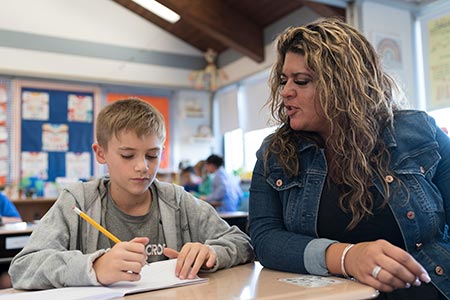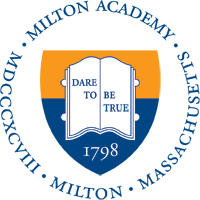Grade 4
Time management, organization, responsibility, and community building are keys to success for Milton’s fourth grade students. Students are assigned a homeroom, from which they move to various classes. Homework and calendar information are distributed online, as students take more ownership of their learning. Weekly affective education classes address problem-solving skills and character development, and encourage Milton’s fourth graders to be “upstanders” who advocate for what is right. An overnight trip to Milton’s Mountain School in Vershire, Vermont, is an opportunity for the class to come together as a cohesive group.
How did the world begin? How is the world interconnected? These essential questions focus learning in Grade 4. In social studies, students explore and understand prehistoric and ancient civilizations, and study the history of Judaism, Christianity, Hinduism and Islam. In math, students work toward a strong grasp of multiplication, and in science, they focus on physics, human anatomy and engineering. A “Living Arts” project requires them to research a particular artist and create artwork inspired by their subject. Fourth graders hone public-speaking skills during presentations to the class. They learn about digital citizenry as they use iPads on a one-to-one basis.
Math
- Content
- Modeling multiplication and division situations with arrays
- Multiplication and division: understanding and using factors and multiples to solve problems
- Multiplicative comparison
- Modeling with data: generating and representing measurement data
- Using the distributive, associative, and commutative properties of multiplication to solve problems
- The role of measurement in 2D geometry
- Using addition and subtraction strategies, and understanding of the number system, to solve problems with large numbers
- Fractions and decimals
- Using the inverse relationship between multiplication and division to solve problems
- Algebraic thinking: analyzing patterns and rules
- K–5 Math Practices
- Make sense of problems and persevere in solving them.
- Reason abstractly and quantitatively.
- Construct viable arguments and critique the reasoning of others.
- Model with mathematics.
- Use appropriate tools strategically.
- Attend to precision.
- Look for and make use of structure.
- Look for and express regularity in repeated reasoning.
Reading
- Reading workshop
- Fiction novels: learning to interpret details and connect character development to literary themes
- Research teams: close reading of nonfiction texts to evaluate credibility and prioritize key information
- Reading historical nonfiction narratives, annotating for research purposes, and interpreting primary sources
- Historical fiction
Writing
- Realistic fiction
- Personal and persuasive essays
- Writing from historical research
- Literary essays: writing about literary fiction
Social Studies
- Sustainability: What are students’ roles as global citizens?
- Archaeology: How do we know what we know about the past?
- Ancient civilizations: Mesopotamia and Egypt
- World religions: Who practices religion and how and where do they do it?
Diversity, Equity, Inclusion, & Justice (DEIJ)
- Anti-bias: creating a safe and comfortable classroom environment; understanding my strengths, skills, and identity; understanding and appreciating differences; understanding bias and discrimination; challenging and confronting bias
- Racial literacy: The development of civilizations: How geography gave some populations a head start (dispelling myths of racial superiority)
- Social justice: Who are the activists in my community? Art and activism.

